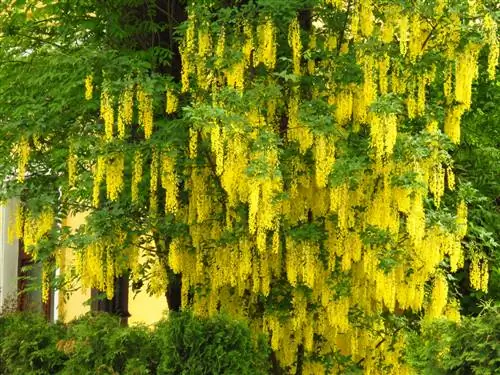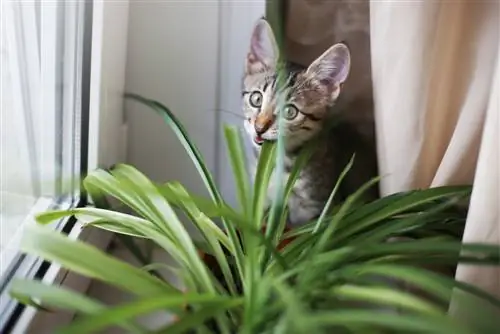- Author admin [email protected].
- Public 2024-01-10 23:11.
- Last modified 2025-01-23 11:22.
There's something in the air! Or maybe not? Maybe the trigger for your allergy is even within your own four walls. Houseplants can also confuse the immune system with their messenger substances. Find out in this article which varieties require caution.

Which houseplants can cause allergies?
Houseplants that can cause allergies are spurge plants (such as birch fig, Christ thorn, rubber tree), daisy plants (such as asters, chrysanthemums) and some types of cacti. Mold in the substrate caused by incorrect watering behavior can also cause allergic reactions.
Spurge family (Euphorbiaceae)
The name of spurge comes from its viscous plant sap, which comes from the inside of the leaf to the surface and forms a protective film on the foliage. People with allergies don't even have to come into contact with the leaves to suffer from the following symptoms:
- Sneezing
- Sniffles
- Hoarseness
- Asthma
- watery, itchy eyes
- Headache
It is often enough for fine dust particles to settle on the leaves, absorb the juice and then spread throughout the room.
Tip
The milkweed juice is even more dangerous if consumed or in contact with skin. Pets in particular can become poisoned.
The spurge plants that are particularly at risk include:
- Birch figs (Ficus Benjamini)
- Christ's thorn (Euphorbia milii)
- Croton (Codiaeum variegatum)
- Triangular spurge/Three-ribbed spurge (Euphorbia trigona)
- Fiddleleaf fig (Ficus lyrata)
- Rubber tree (Ficus elastica)
- Spit palm (Euphorbia leuconeura)
- Poinsettia (Euphorbia pulcherrima)
Asteraceae
Astrology plants are usually cultivated in the garden, but like to move to warm places in winter. Anyone who has a mugwort allergy will have to deal with asthma and a runny nose in winter, because the pollen triggers a cross-allergy and worsens existing symptoms. You should be careful with these daisies:
- Asters (Astereae)
- Chrysanthemums (Chrysanthemum)
Cacti
Cacti are popular office plants because they are extremely easy to care for. Anyone who frequently complains about allergic reactions at work may blame printing ink or fine dust particles. Very few people know that many cactus species irritate the immune system.
Prevent allergies
The houseplant itself is not always responsible for the body's overreaction. Always take a look at the substrate. Mold may have formed on the surface due to incorrect watering. In this case, it is the spores that create a sickening indoor climate. Have you ever thought about starting a hydroculture (€13.00 on Amazon) without soil. This form is considered particularly allergy-friendly and is therefore often used in hospitals. There are also many beautiful house plants that filter pollutants from the air and thus improve the indoor climate, such as the peace lily or the ivy.






